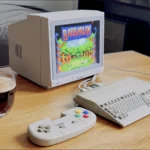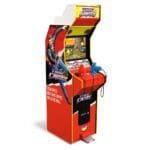In a world where 16,000 Spectrum Next boards already exist, the final Kickstarter (probably) has been announced, aiming to expand the platform’s community of users and developers.
UPDATE (July 20th) : The Spectrum Next 3 has already passed 4x its target £250,000, and still has 28 days to go! Now is a good time to join more than 3000 other backers on the project’s Kickstarter.
It’s an incredibly busy group of people, undoubtedly given a shot in the arm by this computer, and inspired no only to develop new games but magazines too.
Announced on June 2nd, a date of July 19th has been confirmed as the launch date for Kickstarter 3. And it will almost certainly be the final such campaign for the computer, which had its first run in 2017 and a second in 2020.
ZX Spectrum Next specs
Compatible with the original Spectrum 48, 128, +2, +3 and some clones, the ZX Spectrum Next is an FPGA-based computer with RGB, VGA, and HDMI outputs, and — significantly — support for original Spectrum expansion boards.
It basically brings the 1982 computer into the 21st century. These are the specs:
- Processor: Z80 3.5MHz, 7MHz, 14MHz and 28MHz turbo modes
- Memory: 1Mb RAM (expandable to 2Mb internally)
- Video: 256 & 512 colours modes, 256×192 & 640×256 high resolution mode
- Video Output: RGB, VGA, HDMI, 50Hz and 60Hz modes
- Extra Hardware: Hardware sprites, DMA, Copper, Enhanced ULA, Tilemap, Layer2
- Storage: SD Card slot, with DivMMC-compatible protocol
- Audio: 9 channels via 3x AY-3-8912 chips with stereo, plus 2x 8bit DACs output
- Joystick: 2 ports compatible with Cursor, Kempston and Interface 2
- PS/2 port: Mouse with Kempston mode emulation and/or external keyboard
- Special: Multiface functionality for memory access, savegames, cheats etc.
- Tape support: Combined Mic and Ear port for tape loading and saving
- Expansion: Original external bus expansion port and accelerator expansion port
- Accelerator board (optional): GPU / 1GHz CPU / 512Mb RAM
- Network: Wi Fi module
- Extras: Real Time Clock
- OS: NextZXOS and NextBasic featuring expanded commands set
As an FPGA-based system, the Spectrum Next can be configured to run software for other computers. These FPGA cores essentially replicate the functions of other systems, such as the Sinclair QL. In fact, the Sinclair QL core will be included free on the next Kickstarter.
Curiously, a C64 core has also been developed, and given approval by C64 license holders Cloanto. This core will also be part of the third run of Spectrum Next!
Is it really the Spectrum’s last Kickstarter?
Well, the news of a third run has come as a surprise. Some believed it was likely, but as time went on, less so. This news is encouraging, as it means that anyone without a ZX Spectrum Next now has the chance to get hold of one.
But it does seem likely to be the final chance.
Further confirmation of this can be found on the Kickstarter page:
With this third (and likely final) campaign, we hope to expand the community even more in order to make it better for game and app devs to be rewarded for their work: the more people with Nexts in their hands, the more stuff gets made for us all.
So, if you’re interested, sign up to the Spectrum Next Kickstarter page for updates.
On the other hand, if you just want to play old Speccie games, maybe you should consider the much more affordable and ready-to-use The Spectrum.
Affiliate Disclosure: Some of the links in this post may be affiliate links, which means I may earn a small commission if you make a purchase through those links. This comes at no extra cost to you. Thank you for your support!
Christian Cawley is the founder and editor of GamingRetro.co.uk, a website dedicated to classic and retro gaming. With over 20 years of experience writing for technology and gaming publications, he brings considerable expertise and a lifelong passion for interactive entertainment, particularly games from the 8-bit and 16-bit eras.
Christian has written for leading outlets including TechRadar, Computer Weekly, Linux Format, and MakeUseOf, where he also served as Deputy Editor.
When he’s not exploring vintage consoles or retro PCs, Christian enjoys building with LEGO, playing cigar box guitar, and experimenting in the kitchen.






